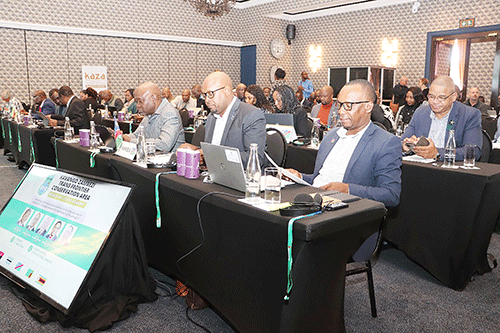Marythar Kambinda
Katima Mulilo – A programme promoting food security and supporting the livelihoods in community conservancies in the KAZA area in Namibia, Zimbabwe and Zambia has been launched in the Zambezi region.
The project, ‘Food Security and Habitat in KAZA’, hosted by the Namibia Nature Foundation (NNF) and funded by the German Ministry of Economic Cooperation and Development, will work towards more effective agro-ecological methods to improve crop production.
The project, which aims to support communities, involves in-house partners such as the Integrated Rural Development and Nature Conservation (IRDNC) organisation, who will carry out the planned activities.
According to Zambezi governor Lawrence Sampofu, around 90 000 inhabitants live in the Zambezi region. Most of the inhabitants are rural, subsistence farmers, living in small villages and dependent on rain-fed agriculture for maize, sorghum and millet production, also growing pumpkins and beans.
“Apart from the agricultural activities found here, this region boasts deciduous woodlands, dominated by trees such as the wild seringa, copal wood and Zambezi teak, unique in Namibia,” boasted Sampofu.
“When I speak about agriculture, we refer to a diverse range of primary products, including livestock and meat products, crop and vegetable farming as well as forestry,” he added.
Sampofu stated how the government has set objectives to take full advantage of development cooperation opportunities and benefits in the agriculture sector offered by international cooperation agreements, and to ensure compliance with agriculture-related international commitments.
As part of the agricultural policy, the government has further set the objective to capacitate farmers with knowledge, skills and attitudes necessary to improve sustainable agricultural production.
“Let us, therefore, recognise the importance of strategic alliances and cooperation to strengthen sustainable agriculture, especially within rural communities, to contribute to food security for today’s generation and the future to come,” noted Sampofu.
Mareike Voigts, project manager at the NNF, emphasised the importance of the project, which focuses on supporting livelihoods, food production as well as habitat protection. The anticipated results include agro-ecological methods to improve crop production.
Grazing and herding can increase livestock and rangeland health and productivity, said Voigts.
She added that platforms in the Zambezi region to enable exchanges on agro-ecological topics and policymakers’ awareness will increase as exchanges in the KAZA region will enable joint learning for improved rural development.
The chief regional officer of the Zambezi, Regina Ndopu-Lubinda, stated how the region has been tasked and was hard at work to ensure that agricultural quality production is increased.
She highlighted the benefits of the project, which include building capacity with many small-scale farmers who have profound knowledge on sustainable farming practices as well as knowledge on improving agricultural techniques, which in turn will help to ensure that food security in the rural communities of targeted conservancies are improved.
“With the improved agricultural practices, we hope to support farmers by reducing the risk of crop and livestock losses to wild animals as human-wildlife conflict has been a major problem in the region”, said Ndopu-Lubinda.
Ndopu-Lubinda then thanked the development partners, being the German Federal Ministry of Economic Co-operation and Development, through the Namibia Nature Foundation, Integrated Rural Development and Nature Conservation and the World Wildlife Fund, for the support received.
Rudolf !Nanuseb from the Ministry of Agriculture, Water and Land Reform said on behalf of the acting executive director that the agricultural sector in Namibia plays a pivotal role in socio-economic development, as most of the rural population depends on agriculture.
“Namibia has a projected population of 2.6 million people, and agriculture is the main source of livelihood to about 70% of the population that resides in rural areas, which is densely populated and dominated by smallholder farmers,” he added.
!Nanuseb stated how the ministry is supporting farmers in the Zambezi region through the provision of advisory services to ensure increased food production and productivity, and by implementing projects and programmes to contribute to poverty reduction across the country in order to ensure that the Zambezi region becomes a food basket.
Projects currently beinmg implemented by the ministry, aimed at food security and the enhancement of livelihoods, include the Dryland Crop Production Programme, Horticulture Support Programme, Poultry Value Chain Development Scheme, the Namibia Agriculture Mechanisation and Seed Improvement Project (NAMSIP) as well as the Small Stock Distribution and Development in Communal Areas Project (SSDDCA).


